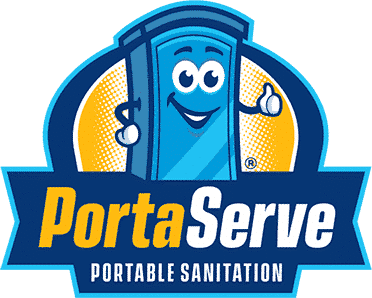Restroom trailers offer numerous eco-friendly advantages, making them an excellent choice for environmentally conscious events and projects. First, they typically incorporate water-saving technologies such as low-flow toilets and faucets, which significantly reduce water consumption compared to traditional restrooms. Some units even come equipped with grey water recycling systems to further optimize water usage.Second, many restroom trailers use solar power or energy-efficient systems to maintain lighting, climate control, and operational features, thereby minimizing their carbon footprint. Additionally, trailers can be strategically located to reduce transportation needs, cutting down on fuel consumption and emissions associated with frequent travel to remote sites. This portability also provides the flexibility to service different locations, thereby eliminating the need for permanent or semi-permanent restroom facilities, which tend to have a higher environmental impact.Third, restroom trailers often use biodegradable and non-toxic cleaning supplies and consumables that help reduce the release of harmful chemicals into the environment. This commitment to eco-friendliness extends to the use of sustainable materials in construction and design, enhancing their overall sustainability. Moreover, by offering a clean, self-contained sanitation solution, these trailers help preserve local landscapes and water sources from the contamination normally associated with makeshift outdoor restrooms.Additionally, multiple event partners can share a single restroom trailer, optimizing its use and reducing the need for multiple units. This shared resource model is not only cost-effective but also environmentally responsible, as it reduces waste and resource consumption. Finally, restroom trailers are customizable, allowing them to be equipped with special features and technologies that promote sustainable use, such as composting toilets or solar panels.In sum, restroom trailers are highly adaptable and innovative in mitigating environmental impacts. They are an ideal choice for event organizers and project managers seeking to uphold their commitment to sustainability while ensuring the comfortable and hygienic needs of all attendees or workers are met.
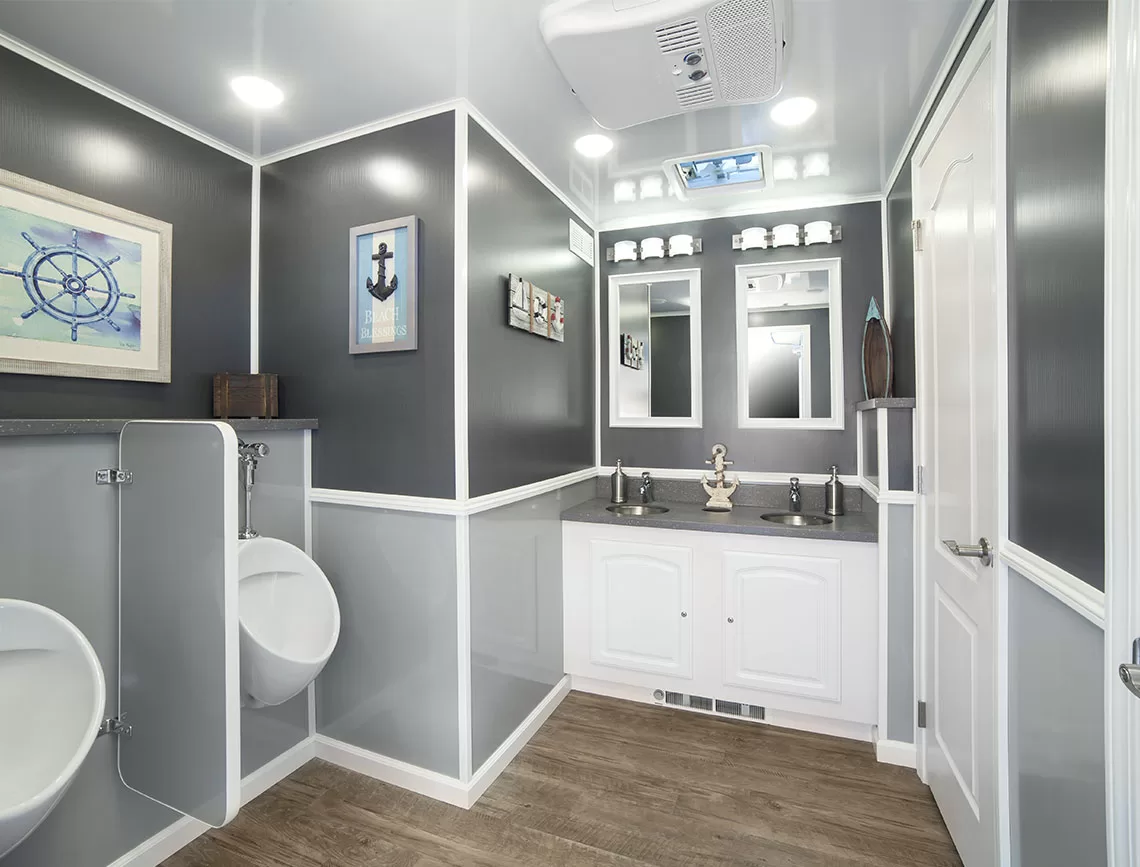
Restroom Trailer Rentals in St. Johns County, Florida
Call today for a free quote (352) 660-8775
Restroom Trailer
Fast, Easy, & 100% Free To Get Started
Trusted Service Over 20 Years
With over 20 years of experience, our Restroom Trailer company is deeply rooted in St. Johns County, committed to providing quality services. We are dedicated to customer satisfaction, ensuring that our clients receive the best portable restroom solutions.
Unmatched Quality Service
Our Restroom Trailers are meticulously maintained to ensure exceptional comfort and cleanliness. We take pride in delivering top-tier services to meet all your portable sanitation requirements.
Swift and Reliable Delivery
Our team ensures that Restroom Trailer delivery is prompt, efficient, and tailored to your schedule. We understand the importance of time, and we are committed to delivering reliable service without delays.
Reliable Restroom Trailer Solutions in St. Johns County
Call for a Free Quote Today
(352) 660-8775
Our company offers premium Restroom Trailer services in St. Johns County and the surrounding areas. As a locally owned business, we pride ourselves on being dependable and reliable, delivering top-notch mobile restroom solutions for all types of events. Whether you're hosting a construction site, a party, a festival, or a wedding, our stylish and comfortable trailers are perfect for any occasion. Our commitment to clean and sanitary facilities makes us the trusted choice for portable restrooms across the region. With years of experience in the industry, we guarantee satisfaction and quality in every service provided. Count on us to enhance the guest experience at your event with our exceptional Restroom Trailer rentals.
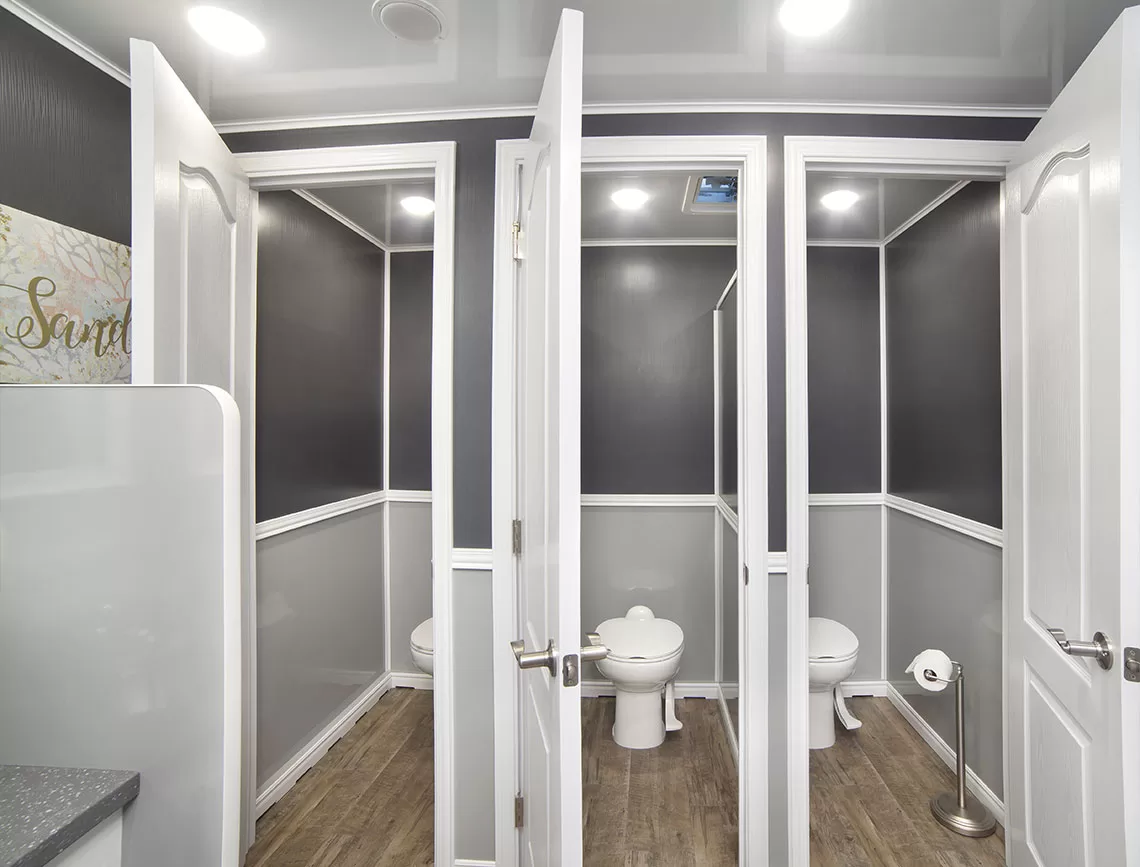
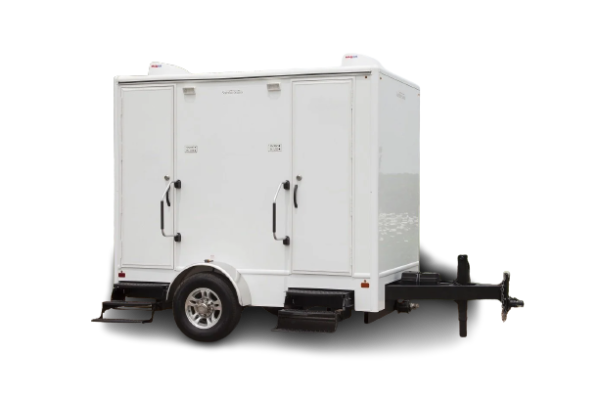
2 RestroomsA compact, stylish solution featuring separate entrances for men and women.Each private suite includes flushing toilets, sinks with running water, interior lighting, and climate control for comfort at any event or worksite.(We offer variants 2–10 stalls.)
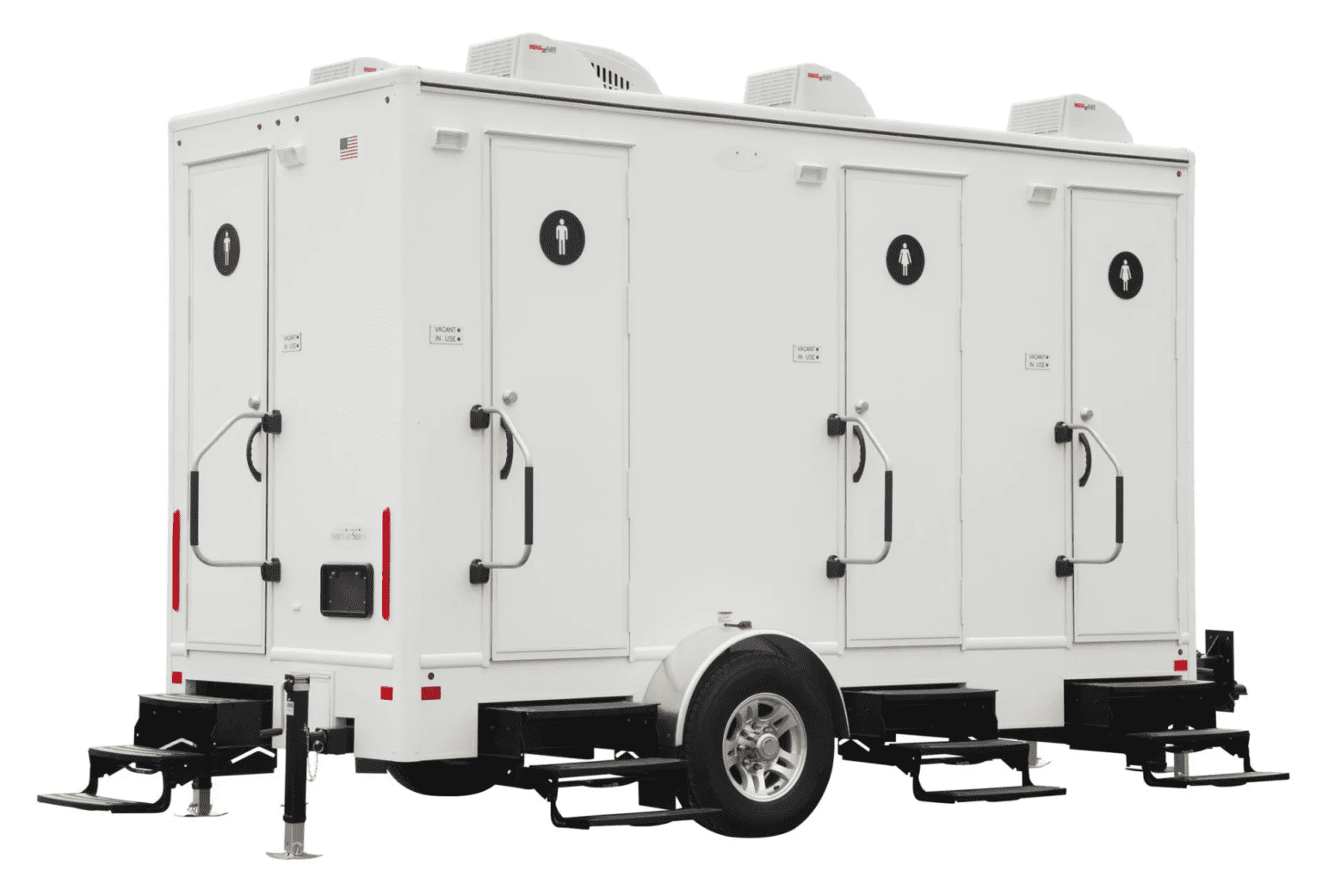
4 RestroomsDesigned for higher guest capacity, this unit offers four private, individual restrooms with flushing toilets, sinks with running water, interior lighting, and climate control.Ideal for weddings, festivals, and busy job sites.(We offer variants 2–10 stalls.)
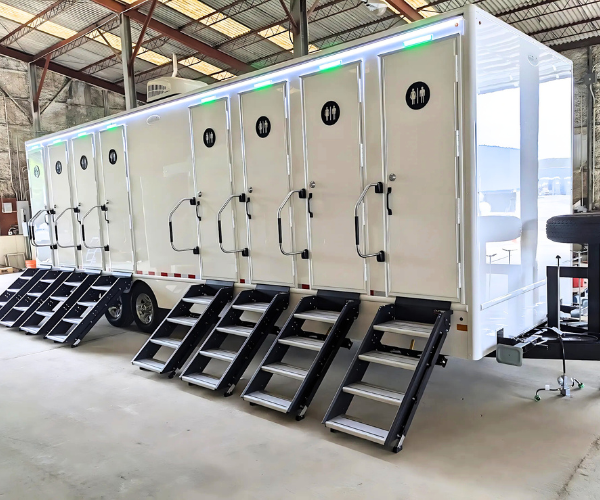
8 RestroomsPerfect for large events and high-traffic sites, this spacious trailer provides eight private stalls, each with a flushing toilet, sink with running water, interior lighting, and climate control.A reliable, upscale solution for maximum convenience and comfort.(We offer variants 2–10 stalls.)
We Proudly Serve
Standard Portable Toilets
Porta Serve in Florida provides clean, reliable Standard Portable Toilets tailored for diverse events and construction sites.
High Rise Portable Toilets
We offer High Rise Portable Toilets designed for easy placement and exceptional sanitation at any height in St. Johns County, Florida.
Restroom Trailers
Porta Serve delivers stylish Restroom Trailers in St. Johns County, enhancing any occasion with quality and convenience.
Roll off Dumpsters
Our Roll Off Dumpsters at Porta Serve offer efficient waste management solutions for all projects in St. Johns County.
Septic Tank Cleaning
Trust Porta Serve in Florida for thorough and dependable Septic Tank Cleaning services, ensuring optimal system performance.
Grease Trap Cleaning
Porta Serve provides expert Grease Trap Cleaning in St. Johns County, Florida, keeping your systems in top condition.
Fencing & Barricades
Porta Serve offers secure, quality Fencing & Barricades solutions for events and safety needs in Florida.
Residential Storage
In St. Johns County, Porta Serve provides reliable Residential Storage services, perfect for secure, long-term solutions.
St. Johns County Restroom Trailer Rentals
Our Restroom Trailer rental service in St. Johns County offers an effortless experience for getting a quote and arranging delivery. With just a few clicks or a quick call, you can receive a comprehensive quote tailored to your specific event needs. We understand that time is of the essence, especially when organizing an event, so our streamlined process ensures you have all the information you need promptly. Our user-friendly website enables you to request a quote easily, providing details such as the number of units required and the event date, so we can offer the most accurate pricing. You can rest assured knowing that our team will handle all aspects of the rental process professionally, from initial contact to delivery and setup. What sets us apart is our commitment to convenience and customer satisfaction, ensuring that every detail is taken care of ahead of time. With our reliable Restroom Trailer service, you can focus on what's most important—enjoying your event.

In the heart of St. Johns County, our Restroom Trailer rental service shines by enhancing your event's ambiance, whether at the iconic St. Augustine Amphitheatre or during the annual St. Augustine Nights of Lights festival. Our trailers seamlessly integrate with the unique charm of these celebrated locales. With high-quality facilities, your guests will enjoy the comfort and cleanliness synonymous with our brand. As an integral part of the local event scene, our company prides itself on offering reliable and convenient Restroom Trailer solutions. Whether it's a bustling cultural gathering or a serene outdoor attraction, our units cater to the dynamic spirit of St. Johns County. Our dedication to service excellence ensures your event experience is both memorable and hassle-free. With an unwavering focus on customer satisfaction, our restroom trailers are not only clean but also equipped with modern amenities to suit any occasion. Trust us to be your partner in delivering exceptional experiences for your guests, designed to elevate the standard of your event.
Your Trusted Local PartnerIn St. Johns County, our Restroom Trailer services stand out for their reliability and unparalleled service quality. Our commitment to excellence makes us the ideal choice for any occasion, ensuring each detail aligns with your expectations. Choose us for your next event to experience top-notch portable restroom convenience and comfort.Exceeding ExpectationsWe prioritize superior customer service and immaculate, dependable units, distinguishing us as the leading provider in the area. Our devotion to the community ensures you receive the finest offerings. Allow us to join your special day and enhance your gathering with our outstanding services.
Consistent and Reliable ServiceWe proudly offer fast and dependable Restroom Trailer services throughout St. Johns County. From the moment you contact us to the final delivery, our dedicated team ensures your needs are met with utmost efficiency. Recognizing the urgency and importance of prompt, high-quality service, we prioritize the smooth operation of your event.Your Satisfaction, Our PriorityDelivering promptly, we pay meticulous attention to detail, ensuring quality remains uncompromised. Our unwavering commitment guarantees your Restroom Trailer arrives on time, enriching your guests' experience. Rely on us to manage the essentials, so you can focus on crafting lasting memories.
St. Johns County: Learn More About Our Restroom Trailer
Renting a Restroom Trailer in St. Johns County is a straightforward process designed to save you time and effort. You can begin by visiting our website, where convenient forms are located at both the top and bottom of each page, alongside prominently displayed 'Get A Quote' buttons. Start by filling out these forms, which require basic information like your first name, last name, phone number, and email.These forms are essential for us to tailor our quotes to your specific needs, detailing the types of restroom trailers you may require and the duration of the rental. For your convenience, the 'Get A Quote' functionalities provide quick access to obtaining detailed information about availability and pricing. This ensures that you receive a tailored response from our customer service team rapidly.Furthermore, inquiries made via these options direct you to our dedicated team, who are well-prepared to assist with event-specific recommendations and logistics, ensuring a seamless experience from start to finish. Should you have specific questions about our services or unique needs for your event, our staff is readily available to provide answers and customize our offerings to best suit your requirements.Once you've submitted your request, you'll receive a follow-up from our team to confirm details, answer any remaining questions, and finalize the rental agreement. Delivery schedules, setup, and service logistics are discussed at this stage to guarantee a hassle-free experience. Our priority is to ensure that the solution we provide not only meets but exceeds your expectations, creating a sanitary and pleasant environment for all your guests.With a focus on customer satisfaction and adaptability to each client's necessities, we strive to offer competitive pricing and comprehensive planning assistance. Thus, whether it's for a wedding, a concert, or a corporate event, you can trust us to facilitate a smooth and efficient rental process, ensuring your event operates seamlessly.
The typical delivery timeframe for Restroom Trailer orders is a crucial factor in our service delivery promise. Understanding the importance of timely services, we have optimized our logistics to offer quick and efficient delivery solutions. Generally, for orders placed within St. Johns County, our standard delivery time ranges between 24 to 48 hours from the confirmation of the booking.However, the exact timeframe may vary based on factors including the volume of trailers needed, the specific location of the event, and any custom features requested. We encourage customers to book well in advance of their events to ensure their preferred delivery times, especially during peak seasons, to guarantee that our resources are allocated correctly to meet demand.To support seamless operation, our logistics team keeps in constant communication with clients throughout the process, providing updates on estimated arrival times and ensuring every setup detail aligns with customer schedules. This proactive approach allows us to adapt to changes or unforeseen circumstances effectively.We take pride in our commitment to offering dependable delivery options that adhere to customer timelines, guaranteeing that our restroom trailers are ready for use well before the event kickoff. Whether for a weekend festival, corporate gathering, or larger event of any kind, we work diligently to accommodate special requests that clients might have regarding delivery specifics.By adopting a customer-first policy, we collaborate closely to manage expectations and optimize the setup and retrieval of equipment. Thanks to our experienced staff and strategic regional presence, we excel in meeting and often exceeding client expectations on delivery timelines, making us a trusted provider in the portable restroom industry.
Yes, we proudly service a wide range of event and construction needs with our versatile Restroom Trailers and related services. Our aim is to provide top-notch solutions for any occasion, ensuring the highest standards of sanitation and convenience. We cater to diverse settings and requirements, offering everything from luxurious trailers for weddings and VIP events to robust facilities for construction sites.Events such as festivals and sporting events are well within our service capabilities. Our trailers are equipped with features suitable for high-traffic scenarios, ensuring continuous service throughout the duration of your gathering. For weddings and corporate events, we offer elegant restroom trailers that blend seamlessly into upscale environments, enhancing guest comfort and satisfaction.Our comprehensive service offerings also include porta potties, roll-off dumpsters, fencing, barricades, holding tanks, ADA-compliant units, portable sinks, and hand sanitizer stations. This wide array allows us to meet the sanitary needs of any event type efficiently, whether it's family reunions, corporate retreats, or any other special occasion requiring high-end restroom amenities.For construction services, we provide robust, reliable units that meet the demands of workers and site managers, ensuring sanitation compliance and convenience regardless of the project's scale. Our capability to deliver tailored solutions means you can focus on the event or construction project knowing that sanitation logistics are professionally handled.We understand the importance of flexibility and customization, and our services reflect a commitment to quality and customer-oriented solutions. By choosing our company, you're opting for a provider that can adapt to various needs, offering professional, memorable, and hygienic experiences across all spectrums of event and construction services.
